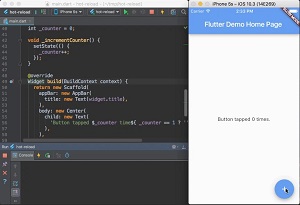News
Visual Studio Dev Lead Leaves for Google's Flutter Team, with a Few Parting Shots
Tim Sneath, a former principal lead program manager for Visual Studio and 17-year Microsoft veteran, has joined Google to work on that company's Flutter mobile app development framework, leaving behind a few parting shots about Microsoft's missteps in the client space.
While Microsoft held a unique position in the industry when he joined on in 2000, Sneath said several mistakes eroded its standing and led to missed opportunities. That prompted his move to the young-but-promising Flutter project, which will see him trading in his C# chops to work with the Dart programming language.
"I think Flutter is 'the real deal,' " said Sneath in announcing his move to Google to work on the open source Flutter SDK.
Sneath held a variety of positions at Microsoft, with one recent title being principal lead program manager for the Visual Studio Platform, leading a team focused on Visual Studio acquisition and extensibility. He has presented in front of the likes of Bill Gates, Jim Allchin and Scott Guthrie and worked on promising technologies such as Silverlight along with Windows and Visual Studio.
Looking back, his experience provides a unique vantage point to comment on Microsoft's missteps.
"Distracted by the engineering challenges of delivering 'Longhorn' (Windows Vista), Microsoft failed to adjust rapidly to the new competitive threats posed by the rise of the standards-based Web and the resurgence of Apple and the iPhone," Sneath said. "Its rapid growth left it with the defender's dilemma of being attacked by all sides, while also being unwilling to sacrifice existing businesses for new opportunities."
Silverlight eventually fell off the company's radar screen, and Windows Phone effectively died.
"Meanwhile, infighting between different divisions left client developers in the Microsoft ecosystem caught in the crossfire, with little clarity for those who wanted to bet on something that would endure," Sneath said. "Customers started to look elsewhere, attracted both by the new monetization opportunities of iPhone and the exploding ecosystem around the Web."
Apparently Sneath decided to look elsewhere, too, and settled on Flutter as a landing spot.
 [Click on image for larger, animated GIF view.]
Animated Flutter Demo (source: Google)
[Click on image for larger, animated GIF view.]
Animated Flutter Demo (source: Google)
"Flutter is a new mobile app SDK, currently in alpha, that empowers developers and designers to build modern mobile apps for iOS and Android," Sneath said. "Flutter is optimized for building highly-branded, graphically-rich mobile experiences; it leverages Skia, the graphics engine that powers Chrome, and adds a React-inspired widget framework, UI components, animation models, layouts and themes that enable a seamless look and feel on both Android and iOS. You can write Flutter apps from Windows, Mac or Linux -- and there is tooling support for IntelliJ, Android Studio or Visual Studio Code."
Google took the wraps off Flutter in November 2015, another attempt at mobile cross-platform nirvana that has yet to be reached. Yet Sneath seems to think that elusive goal is imminently attainable.
"While it's still very early days, the team are onto something big," Sneath said of Flutter. "They have hit a sweet spot of productivity and power, and have the momentum and backing to be successful. The ability to write an app that runs on both iOS and Android, with one code base, without compromise, using a highly productive language and set of libraries -- it's a compelling value proposition."
About the Author
David Ramel is an editor and writer at Converge 360.